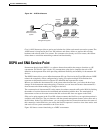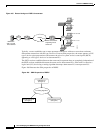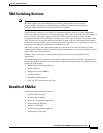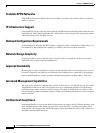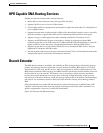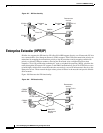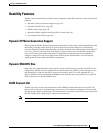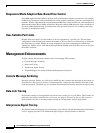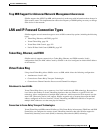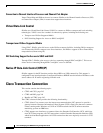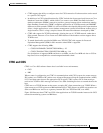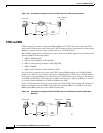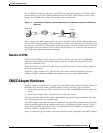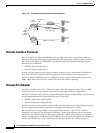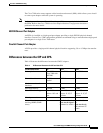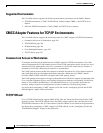
Overview of IBM Networking
LAN and IP-Focused Connection Types
BC-241
Cisco IOS Bridging and IBM Networking Configuration Guide
Trap MIB Support for Advanced Network Management Awareness
SNASw supports the APPN Trap MIB, which proactively sends traps with information about changes in
SNA resource status. This implementation reduces the frequency of SNMP polling necessary to manage
SNA devices in the network.
LAN and IP-Focused Connection Types
SNASw supports several connection types to serve all SNA connectivity options, including the following
types:
• Token Ring, Ethernet, and FDDI, page 241
• Virtual Token Ring, page 241
• Virtual Data-Link Control, page 242
• Native IP Data-Link Control (HPR/IP), page 242
Token Ring, Ethernet, and FDDI
SNASw natively supports connectivity to Token Ring, Ethernet, and FDDI networks. In this
configuration mode, the MAC address used by SNASw is the local configured or default MAC address
of the interface.
Virtual Token Ring
Using virtual Token Ring allows SNASw access to SRB, which allows the following configuration:
• Attachment to Local LANs
• Connection to Frame Relay Transport Technologies
• Connection to Channel Interface Processor and Channel Port Adapter
Attachment to Local LANs
Virtual Token Ring allows you to connect to local LAN media through SRB technology. Because there
is no limit to the number of virtual Token Ring interfaces that can connect to a specific LAN, this
technology allows configuration of multiple MAC addresses, which respond to SNA requests over the
same LAN. When using native LAN support, SNASw responds only to requests that target the MAC
address configured on the local interface. Virtual Token Ring and SRB allow SNASw to respond to
multiple MAC addresses over the same physical interface.
Connection to Frame Relay Transport Technologies
Virtual Token Ring and SRB connect SNASw to a SNA Frame Relay infrastructure. FRAS host and SRB
Frame Relay are configured to connect virtual Token Ring interfaces that offer SNASw support for
Frame Relay boundary access node (BAN) or boundary network node (BNN) technology.



